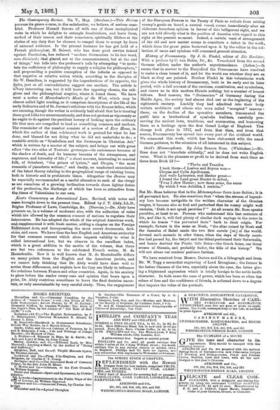The Contemporary Review. No V., May. (Strahan.)—This Review pursues.its grove
course, to the satisfaction, we believe, of serious man- kind. Professor Mansell throws off with one of those metaphysical webs in which he delights to entangle freethinkers, and leave them, sacked of their reason and their conscience, spiritually lifeless at the shrine of any duty that he chooses to compel them to accept by force of external evidence. In the present instance he has got hold of a French philosopher, M. Saisset, who has done good service indeed against Pantheism, has reduced "modern Germanism to its last word, man divinized ; God placed, not at the commencement, but at the end of things," but falls into the professor's toils by attempting "to main- tain the sufficiency of philosophy to supply a religion for philosophers," and propounding a positive conception of the infinite as opposed to that negative or relative notion which, according to the disciples of Sir W. Hamilton, is suggested by the imperfections of its opposite, the finite, just as all contradictories suggest one another. The article is rAery interesting one, but it will leave the opposing classes, the reli- gious and the philosophical sceptics, where it found them. We have next a notice of Mentalemberes Monks of the West, which may be almost called light reading, as it comprises descriptions of the life of the early Solitaries and of St. Jerome's relations with the Roman ladies, which are amusing, though the writer is evidently half afraid that he is treating these good folks too unceremoniously, and does not protest as vigorously as he ought to do against the pestilent heresy of looking upon the ordinary life that men are compelled to lead as something common and unclean. The remainder of the number consists of a review of Ecce Homo, in which the author of that celebrated work is praised for what he has done, and blamed for not doing what he did not undertake to do ; a readable article on " Symbolism and the Grotesque in Christian Art," which is written by a master of the subject, and brings out with great effect "the two sides of Teutonic grotesque—its seriousness because of the shadow of death, and its humour because of the strangeness, and eagerness, and intensity of life ;" a short account, interesting to musical folk; of Schubert, "the prince of lyrists," and Chopin, " the most romantic of pianoforte writers ;" and finally, an unadorned enunciation Of the latest theory relating to the geographical range of existing fauna, both in historic and in prehistoric times. Altogether the Review may be especially recommended as a useful alterative to such of the clergy as are conscious of a growing inclination towards those lighter duties of ' the profession, the discharge of which has been so attractive from
ths,times of Valentinian to our own.






























 Previous page
Previous page